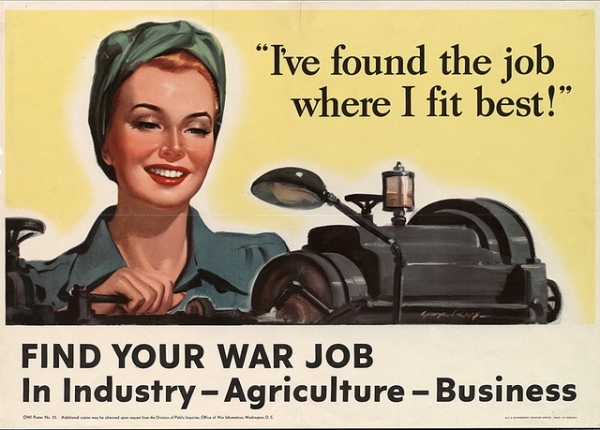With less than a month to go before we leave for France, I have to say I’m really nervous! I’ve been doing my head in organizing my project, trip details, funding ideas, what to wear, what to say, etc. etc. and was sincerely worried that I wouldn’t be able to pull anything together before the big leaving day on September 10th. But with a bit of motivation from my friends and family, I’ve managed to stay relatively calm and put my head down! I’d like to give a huge thanks to Madame Bush-Daumec from Wellington College for sharing her World War 1 resources with me and helping out with my project. Through a lot of research and conversation with my those around me, I’ve settled on a few key things that I want to explore throughout my project and trip. But first, I’d like to tell you a little bit about women’s place during the First World War…
Prior to the war, women led somewhat restricted lives, a long shot from my life as a 17 year old girl in 21st century New Zealand! Women married young, started families early, and were expected to stay home and take care of the house and family. At the time that the war broke out, only 5% of married women worked, mainly taking domestic roles such as cooks or servants if they did. Many wealthier women who could afford to be educated found that they could do nothing with their qualifications, as high paying jobs such as doctors and lawyers were almost always held by males. These strict, limiting societal expectations for pre-war women led to frustration, which sparked the suffragette movement in the late 19th and early 20th century. Women fought for equal rights, specifically the right to vote and have their opinions heard. In 1893, New Zealand became the very first country to allow women to vote, through an inspiring push for change led by our very own Kate Sheppard!
Then came the war in 1914, an tragic outbreak centred in Europe that sucked many outside forces in. The effects were devastating for those countries involved, and the suffragette movement ground to a halt, as war posed a much greater issue on everyone’s minds. Men worldwide were being conscripted at rapid rates to fight for their countries, and they had no choice but to fight or be seen as a coward. The effect this had on women back home was massive. They found themselves having to take over traditionally male roles while they were at war. They would work in factories, on farms, in offices, some women in France even took over as streetcar conductors! It was necessary that women have a means of income while their husbands and fathers were away, and these jobs urgently needed filling. Women found this sudden change both challenging and enlightening, as they were able to hold power for the first time in a society that previously pushed them aside!
We even saw women on the front lines of the war. Many took jobs as nurses and worked in hospitals near battlefields. They came face to face with horrible injuries and fatalities, and made it their job to save or cheer up as many soldiers as they could. They faced great danger working so near to the battle ground. Many hospitals were bombed by enemies, and nurses were often caught in crossfire when going to retrieve bodies from the fields. These women were the heroes we don’t often hear about when learning about World War 1. They worked behind the scenes of the war and were the reason many soldiers survived such a tragedy/ I believe that these women deserve as much honour as the soldiers who risked their lives on the front lines.
In my next blog post, I’m going to talk about two very different women who were of great help during World War One. Although from different sides of the world, their bravery and generosity in the face of the war was equally inspiring!



